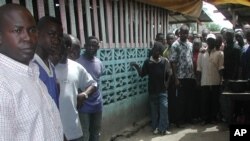Human rights activists and Africa scholars say the new president in Ivory Coast, Alassane Ouattara, faces very difficult and possibly competing challenges of pursuing reconciliation and justice following years of division in the West African nation.
At a Friday event at the United States Institute of Peace, panelists said Mr. Ouattara has several options which could overlap, including pursuing justice within the limited Ivory Coast judicial system, eventually referring cases to the International Criminal Court, setting up a hybrid international-Ivorian tribunal, as well as creating a Truth and Reconciliation commission.
An expert in African politics from George Washington University, Gina Lambright, says it is a complex equation which will have to satisfy Ivorians to ensure a stable and prosperous future.
"This idea that you are not just trying to bring people to account but that you are trying to build agreement on a broad narrative, both about history but also thinking about the nation going forward and what the narrative will be," Lambright said.
Panelists said Ivorians must also decide the time frame which will be reviewed. Political violence escalated with a 1999 coup, divided the country in two after a rebel uprising in 2002, and continued after disputed elections last year. The most recent violence included attacks against civilians in the main city Abidjan and in western ethnically-tense areas.
The Africa advocacy director for U.S.-based Human Rights Watch, Jonathan Elliot, accused Mr. Gbagbo of trying to create chaotic conditions to justify remaining in power after last year's elections the United Nations says he lost.
"He was seeking to provoke ethnic, sectarian, and other fissures in Ivorian society to his advantage so the killings that were taking place in Abidjan were not random, they were deliberate," Elliot said.
The former president was finally captured by pro-Ouattara former rebels at the presidential residency on April 11.
But Elliot said it is important the justice and reconciliation process does not become one of winners and losers. He said former rebels should also be held accountable, including current prime minister Guillaume Soro. Elliot listed atrocities by rebels under his command which include fighting within rebel ranks.
"Putting prisoners for example into shipping containers and leaving them there until they died, torture, extrajudicial executions. But it is also relevant to what happened in the west of the country in late March before this conflict came to an end. We saw a series of massacres committed by pro-Ouattara forces in the west, notionally under the command of Soro but also several other commanders and also local militias mainly targeted at the Guere ethnic group," Elliot said.
Professor William Zartman from Johns Hopkins University said he does not believe the arm of justice, however patient, will reach that far. "The best one can hope for, it will not satisfy Human Rights Watch, the best one can hope for is that there will be a couple of people from the Ouattara side that will be brought to justice but reaching up to the top of a national liberation movement, the top is out of reach," Zartman said.
Fighting between pro-Ouattara forces continued this week with the killing of a renegade former rebel leader, Ibrahim Coulibaly. Some of his fighters who were being detained at an Abidjan camp said they were being tortured.
So far, a criminal probe has been launched against former President Gbagbo, his wife Simone, who has been implicated in death squads during her husband's presidency, and 100 other close associates, who are being detained or under house arrest. Panelists said the fate of the pro-Gbagbo youth militia leader Charles Ble Goude remains unclear, but that if found alive, they hope he will also be brought to justice.
All main protagonists in the Ivory Coast violence have denied any direct link to killings or atrocities.
Meetings have been scheduled for next week between Mr. Ouattara and former United Nations Secretary-General Kofi Annan and South African Nobel peace prize laureate Desmond Tutu to discuss the Truth and Reconciliation idea, and learn from other experiences, including the South African post-apartheid period.









